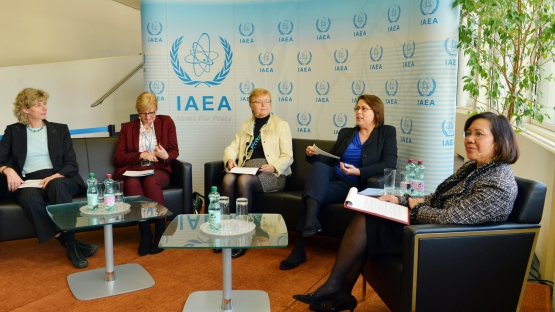In celebration of International Women’s Day 2015, the IAEA hosted another riveting panel discussion, this time focusing on powerful women serving on academic, national and international boards, and at the head of international organisations.
The discussion dealt with a wide range of issues including: the small number of women board members worldwide and strategies to improve gender parity at the top of influential organizations; being role models for young professional women; gender-based quotas and whether or not they are effective; work-life balance; education, talent pipelines and reasons that women are not chosen or are not available to be considered for top positions.
Watch the full panel discussion here.
The panel was comprised of: Simonetta Di Pippo, Director of the United Nations Office for Outer Space Affairs; Marie-Elise Hoedemakers, Senior Policy Advisor for International Nuclear Affairs at the Ministry of Economic Affairs of the Netherlands; Allison Macfarlane, Director of the Center for International Science and Technology Policy at George Washington University’s Elliott School of International Affairs; and Marta Žiaková, Chairperson of the Nuclear Regulatory Authority of the Slovak Republic.
The event was moderated by Janice Dunn Lee, IAEA Deputy Director General and Head of the Department of Management. She said “Women bring diverse problem-solving abilities and a diversity of views to organisations. That’s why it’s healthy for more women to be on boards, and for more women to be parts of organisations.”
Dunn Lee added, “My passion and urgency for female empowerment is motivated by the saying ‘If not me, who – and if not now, when?’ With the dominance of men in the nuclear-related areas of science and technology, as scientists, engineers, managers and leaders, I believe we’re missing out on the talent of equally well-qualified women. I want both men and women to have equal opportunity to succeed and bring value to the work we do at the IAEA.”
While noting that the “situation for women in science has improved a lot over the years”, Director General Yukiya Amano, during his opening remarks, brought attention to the need for greater female participation in IAEA technical cooperation projects. “I believe our technical cooperation projects are much more likely to succeed if the perspectives and needs of all stakeholders – male and female – are taken into account. Women in countries which receive technical cooperation need to be actively involved in the planning and implementation of projects if they are to have maximum impact.”
The panel discussion was held on the margins of this week’s IAEA Board of Governors meeting.
Women bring diverse problem-solving abilities and a diversity of views to organisations.




